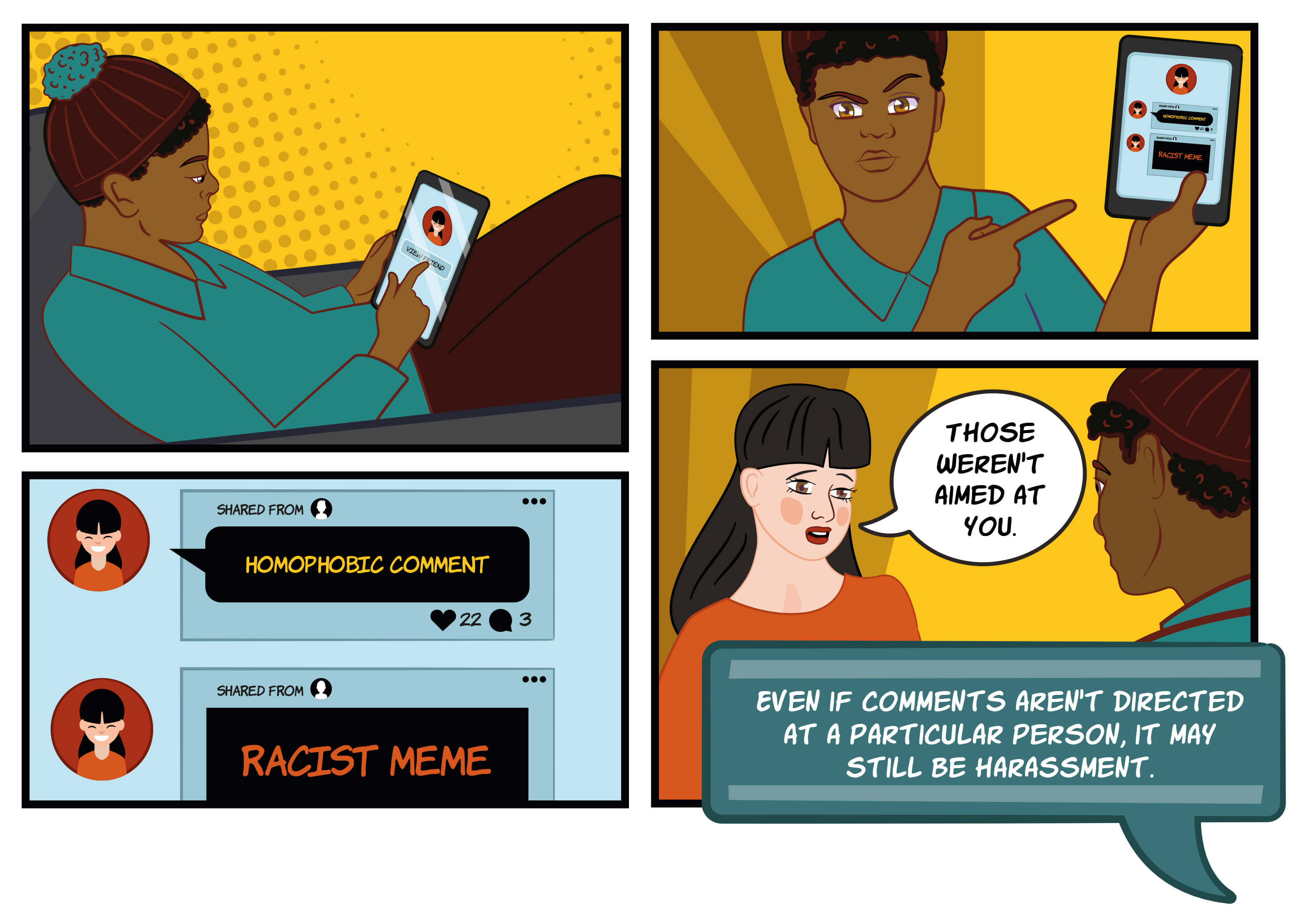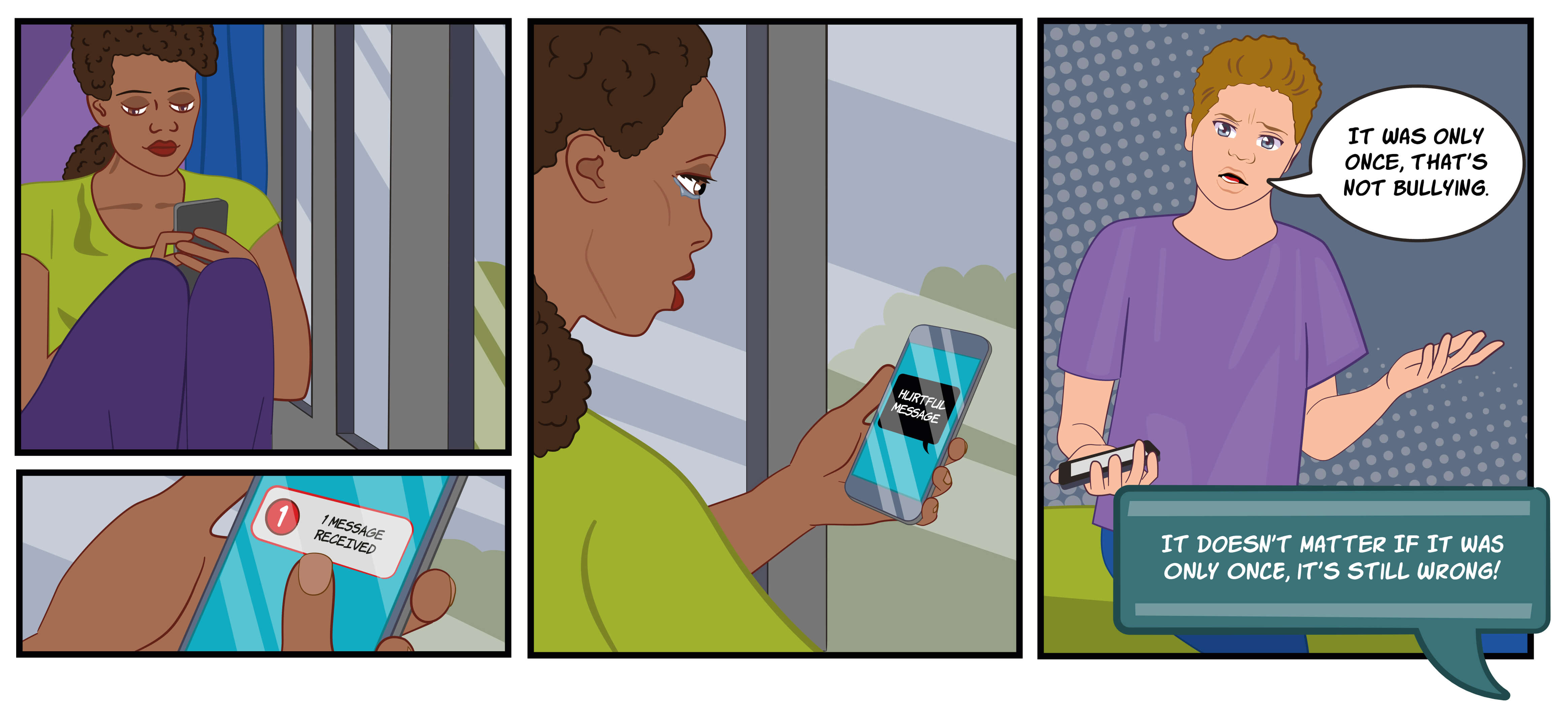Internet and social media networks have given the traditional schoolyard bully a new weapon to use against their targets, and the number of people a cyberbully can reach is now far greater. Bullying and harassing online can be anonymous and carried out without the knowledge of either friends, parents or educators. This type of behaviour can be relentless, without the need for the perpetrator to be physically present with those affected.
Behaviour and content that creates a hostile, offensive or degrading environment is harassment if it is racist, sexist, of a sexual nature, targeted at a religion/belief, at gender identity or reassignment, at sexual orientation, age, or disability.
It makes no difference if that was not the intention of the person who posts the material, it is enough that that is the effect.
It will not matter if the person affected is not the target of the material. Even if the material is generally racist (for example) and it creates a hostile degrading or offensive environment – that is harassment.

It will not matter if the person affected does not share the characteristics targeted. It does not matter if you yourself are not gay, or Muslim, or have a disability etc. If the material creates a hostile, offensive or degrading environment – that is enough.

This concealed and pernicious form of bullying has risen dramatically in recent years with the explosion in popularity of social networking sites, such as Snapchat, Facebook, Instagram, Tumblr, Reddit and Twitter, making users vulnerable to attacks. Group messaging apps like WhatsApp and Whisper, gaming sites such as Xbox Live, and chat rooms are also very popular with students, where bullying can be even more commonplace in the form of banter and private messaging.
Cyberbullies thrive on social media and take advantage of opportunities presented by the interconnected nature of social networking sites. Some online applications allow users to post anonymously, enabling cyberbullies to hide behind an alias.
Cyberbullies desire social dominance and peer acceptance. This is the same for traditional bullying but carried out through different means.
Cyberbullies tend to have lower empathy, which means they sometimes cannot appreciate how their actions may impact on someone. Another characteristic is a lack of self-controlled behaviour, such as those who seek immediate pleasure, without much consideration of the long-term consequences of their behaviour or actions.
There is also a ‘revenge of the nerds’ hypothesis – youths that were targets at school seeking to retaliate online.Sadly, extensive research has also shown that traditional school bullying commonly leads to cyberbullying.
However, you should know that people who bully never do so for the fun of it. Most often they do it because at some point in their lives they too have been exploited and abused. They have had the experience of feeling powerless and out of control. Not all cyberbullying is intentional. It may be something as simple as liking a mean post or spreading a rumour in a private group. However, the impact on the recipient can be devastating.
Cyberbullies desire social dominance and peer acceptance. This is the same for traditional bullying but carried out through different means.
Cyberbullies tend to have lower empathy, which means they sometimes cannot appreciate how their actions may impact on someone. Another characteristic is a lack of self-controlled behaviour, such as those who seek immediate pleasure, without much consideration of the long-term consequences of their behaviour or actions.
There is also a ‘revenge of the nerds’ hypothesis – youths that were targets at school seeking to retaliate online.Sadly, extensive research has also shown that traditional school bullying commonly leads to cyberbullying.
However, you should know that people who bully never do so for the fun of it. Most often they do it because at some point in their lives they too have been exploited and abused. They have had the experience of feeling powerless and out of control. Not all cyberbullying is intentional. It may be something as simple as liking a mean post or spreading a rumour in a private group. However, the impact on the recipient can be devastating.